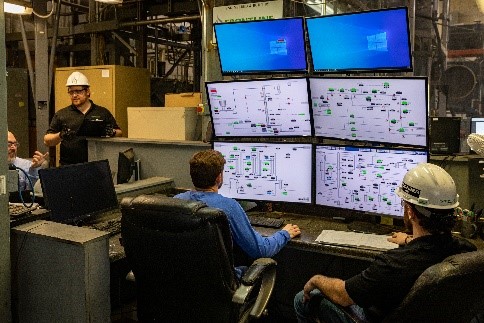Frontline Participates in TC Biomass Conference
September 16, 2009Frontline BioEnergy CEO, William A Lee, Speaks at Biomass Co-Firing Symposium
October 19, 2009Innovator in ethanol industry taking on new ground
by Tom Cherveny
BENSON — Bill Lee is leaving an ethanol plant known as a leader in innovation for what he believes will be the next big step in renewable energy.
Lee said he believes biomass from agricultural and forest-product residues will be playing an ever bigger role in not only providing the power to convert corn to ethanol, but also to produce the electricity that lights our homes.
Lee has been CEO since June at Frontline BioEnergy LLC in Ames, Iowa. He has continued to serve as general manager of the Chippewa Valley Ethanol Company’s plant in Benson — a facility he had led since it opened in early 1996 — while the search for his successor took place.
The Benson plant was one of the ethanol industry’s pioneers of the Minnesota model: farmer-owned cooperatives producing value added earnings for corn growers.
The Benson ethanol company has also gained attention for its diversification into Shakers premium vodka and Prairie organic vodka, leadership on E-85 and ethanol policy issues, and more recently, new technology using biomass to help power its operations.
Chippewa Valley Ethanol Company is the majority owner of Frontline BioEnergy, which owns the technology for the Benson ethanol plant’s gasifier.
In operation for more than a year now, the gasifier uses biomass ranging from wood chips to corn cobs to produce a synthetic gas that is used in place of natural gas. It could eventually power 90 percent of the operations at the plant, which produces 48 million gallons of biomass a year.
The gasifier could obtain 60 to 65 percent of its fuel supply from corn cobs harvested in the cornfields owned by the plant’s farmer owners, according to Lee.
Using corn cobs and crop residues as biomass fuel is a value-added economic opportunity for farmer-owned ethanol plants, Lee said.
There’s an environmental and policy incentive as well: Taking advantage of biomass to produce ethanol greatly reduces the carbon footprint associated with production of this transportation fuel. It’s a big step toward a carbon neutral footprint, he explained.
The Frontline technology allows its gasifier to essentially be “plugged in’’ to the boiler systems of existing plants, Lee said.
Frontline aims to bring its technology first to the many ethanol plants around the country now relying on coal to fire its boilers. Doing so would end the carbon and mercury emissions associated with coal use at those plants.
He also believes that biomass will prove to be very competitive with fossil fuels. The world is increasingly looking to tap harder-to-reach, more costly and “dirtier’’ sources of fossil fuels as demand grows and known reserves run out, he said.
Frontline’s technology allows its gasifier to utilize a wide assortment of crop and forest feedstock as its fuel, and mix and match them as supplies and costs dictate.
It offers the potential of being a low carbon, cost-competitive means of producing electricity, according to Lee. He said Frontline anticipates that much of its future will be devoted to powering 100 megawatt-sized power plants in the country’s eastern markets.



